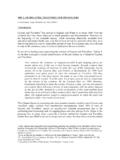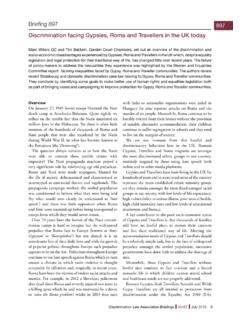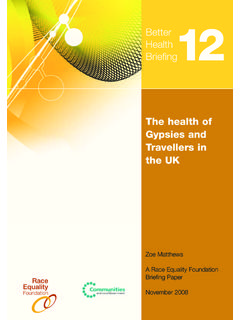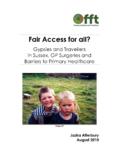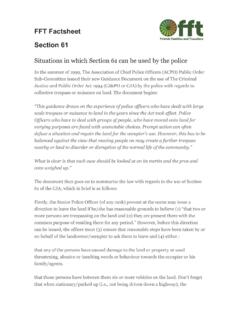Transcription of The National Gypsy and Traveller Health Inclusion Project ...
1 The National Gypsy aNd Traveller Health Inclusion Project 2012 - 2015 The National Gypsy and Traveller Health Inclusion Project 2012 -15 a report compiled by Rachel Wemyss and Zoe Matthews - Friends Families and Travellers Helen Jones - Leeds GATE The National Gypsy aNd Traveller Health Inclusion Project 2012 - 2015 Forewordi am delighted to introduce this report prepared by Friends, Families and Travellers and leeds GaTe as the culmination of their joint National Gypsy and Traveller Health Inclusion Project , funded by the department of Health s innovation, excellence and strategic development Grant programme. The Project builds upon the work of professor sir Michael Marmot and his seminal report Fair society, healthy lives and the recognition of Gypsies and Travellers as a chronically excluded group within the Inclusion Health report highlights the extent to which the Health inequalities experienced by Gypsies and Travellers are firmly entrenched, and that while the production of policies, guidelines and good practice frameworks are important, they are not necessarily sufficient to achieve the change needed to improve the Health and wellbeing of these communities.
2 Crucially, this report adds practical recommendations which set out the mechanisms through which positive and sustainable change may be achieved. i hope that the report will be read and discussed by policy makers and commissioners at all levels and shared within Health & Wellbeing Boards, clinical commissioning Groups and local healthwatch groups. These bodies all have apart to play in reducing the Health inequalities that exist within our society and this report provides some valuable insights as to how to go about the Ray Earwickersenior policy Manager ( Health inequalities and Inclusion Health )department of Health executive Summary This Project was funded by the Department of Health and was aimed at addressing the chronic exclusion of Gypsies and Travellers across the Health economy, supporting the Inclusion Health agenda and leading to improvements in the Health of Gypsy and Traveller people in England. Two leading organisations in this field worked to provide a package of commissioning and implementation support to all levels of the new NHS architecture.
3 The Project commenced shortly after the Health and social care act ( 2012 ) was published, which for the first time placed an equality duty on the secretary of state for Health . it also came on the heels of publication of The Marmot report - Fair society, healthy lives. critically the Marmot report outlined the significant costs to the public purse generated by Health inequities. subsequent statements by professor sir Michael Marmot have indicated his view that whilst investment across the Health gradient is required, investment should be targeted proportionally to reduce Health inequity where it is most extreme. What data we have tells us that Gypsy and Traveller people are amongst the most vulnerable to Health inequity. The National Gypsy and Traveller Health Inclusion Project was never a soft Project , we were not specifically attempting to generate local good practice (although we have). FFT and leeds GaTe were seeking to observe, and perhaps positively influence, how the new commissioning environment would impact on improving Gypsy and Traveller Health .
4 As well as providing support, the organisations were able to utilise emerging guidance and commissioning tools to implement changes on the ground and at a local level. This has meant that we have been able to see first-hand how policy has translated into action for vulnerable and marginalised communities, and also where and why it is failing. Gypsy and Traveller people s Health is important on its own account but we might also view the Inclusion of Gypsy and Traveller people s Health , or not, as an exemplar of how the system deals with extremes of Health inequity. our conclusion must be that the new Health commissioning system deals with such extremes very badly, often reinforcing, rather than addressing them, with all of the ongoing costs (human, social and financial) thereby generated. 1 New economics Foundation, The wrong medicine: a review of the impacts of Nhs reforms in england - and the NHSWe are not convinced that there are market solutions to Health inequalities.
5 Structural and cultural change is needed within Nhs organisations and beyond to tackle the root causes of avoidable Health inequalities. The move from primary care Trusts to ccGs means there is a less direct route to influence Nhs services as commissioners buy services from any qualified provider. There is a problematic culture of compliance in that the risk management role of commissioners can cause Nhs organisations to act evasively rather than co-operatively when challenged regarding what action they are taking to address Health inequalities. investment in ensuring equitable access to primary care for Gypsies and Travellers and other Inclusion Health groups is an ethical imperative that makes financial sense in the long term. a market for innovative solutions that improve Health outcomes and save ccGs money in the short term will not get to the root of the problem. The New economics Foundation (nef) report The wrong medicine: a review of the impacts of Nhs reforms in england found that market mechanisms and privatisation in healthcare systems have largely inconclusive or negative effects on quality and equity in healthcare.
6 1 Marketisation of the voluntary sectorsimon stevens aspiration in Nhs england s Five year Forward review for stronger partnerships with charitable and voluntary sector organisations recognises that the voluntary sector are often better able to reach underserved groups, and are a source of advice for commissioners on particular needs. 2 however, in the current climate small voluntary sector organisations who are close to the ground and connected to local communities are struggling to survive, competing against each other for scarce funding against National charities with bid-writers, policy, campaigning and fundraising providers who do not have relationships with Gypsy Traveller communities can find themselves unable to fulfil contract requirements to engage with these communities. organisations must build their capacity to provide services that are accessible to all communities and where necessary buy in the time and expertise of Gypsy Traveller organisations who are trusted by community members.
7 Where is the capacity in the voluntary sector to hold local CCGs and HWBs to account? public Health in local authorities is accountable to the public. however, Health inequalities do not garner much public interest and Gypsy Traveller Health issues specifically even less so. National direction and oversight is needed as democratic processes do not necessarily promote equality and Inclusion . localism within the Nhs is supposed to improve accountability and legitimacy; but a lack of political will risks impeding critical work to address Health inequalities experienced by socially excluded communities. inclusive Health services cannot be achieved through inclusive documentation alone, although this is an important first step. it is relatively easy to write a visionary document making an organisational commitment to equality, diversity and human rights but delivering services that are rights-respecting and fully inclusive of all communities takes time and sustained investment.
8 It is in this context that we have produced the following recommendations. 2 Nhs england, Five year Forward review, Government Ministers and Departments, including but not exclusive to the Dept of Health , the Dept of Communities and Local Government and the Department of Work and Pensions. The social and economic conditions in which we live lead to avoidable Health inequity, increasing risk of illness and preventing access to treatment. The root causes of these inequalities need to be addressed in terms of secure homes, access to education, good employment, financial Inclusion and citizenship. a healthy society requires a living wage and a welfare state which provides an effective safety net. it would appear that currently the cost of Health inequity is either misunderstood or disregarded, especially where budgets are allocated within departmental silos. difficult and potentially unpopular choices require more than courageous leadership to resolve.
9 The impacts of localism, austerity and the marketisation of public services damage the principle of universal access, which in turn is likely to reinforce inequalities. The responsibilities to address wider determinants of Health would be made more explicit through the actioning of a uK roma integration strategy as required by the european union Framework for roma integration. roma civil society groups recently called for evidence of progress on this agenda. see Gypsy Traveller , and Roma: Experts By Experience: Reviewing UK progress on European Union Framework Roma integration strategies3 The costs of failing to address Health needs should be understood and the profile of the issues raised. Health inequities created by departmental policies other than those of dh should be mapped and addressed (for example in the under-provision of sites nationally and the disproportionate refusal of planning permission for Gypsy Traveller applicants)3 NHS England / Public Health England Much good work has taken place since the Health and Social Care Act 2012 .
10 Despite obvious challenges we have seen senior leaders speaking directly to community members and championing the needs of people experiencing inequality in accessing healthcare. We need to remain optimistic and build on progress made: promote and fund opportunities for effective means for dialogue between communities and Nhs england/phe leadership developing system leaders to drive forward action on Health inequalities and community based action. promote and invest in collaborative partnership work between communities, civil society groups, local public Health and ccGs using advocacy, co-production and asset based approaches to reducing Health inequity at the margins , Gypsies and Travellers, vulnerable migrants, sex workers and homeless peoplepublicise the business case for addressing Health inequality and for people powered Health , supporting local providers to improve the Health of the poorest fastest and encouraging investment in community based action and supporting sustainability of trusted organisations.

